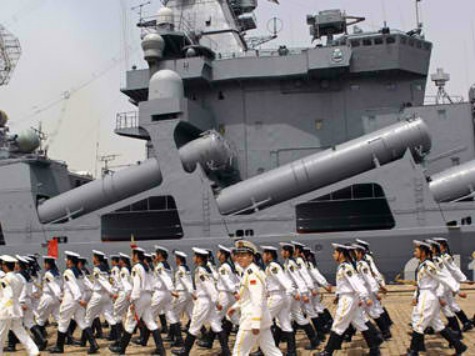
This morning’s key headlines from GenerationalDynamics.com
- ‘Homegrown jihadists are France’s gravest threat’
- Vietnam develops increasingly dangerous strategy to counter China
- Saudi Arabia reports significantly more deaths from MERS virus
‘Homegrown jihadists are France’s gravest threat’

Homegrown jihadists are France’s gravest threat (AFP)
On May 24, a gunman entered the Jewish Museum in Brussels and shotthree people dead, wounding a fourth. The perpetrator, MehdiNemmouche, 29, was finally captured on Monday, June 1, at a trainstation in Marseille. What has particular concerned Frenchprosecutors is that Nemmouche had been radicalized by the IslamicEmirate in Iraq and Syria (ISIS) while spending a year fighting inSyria.
According to France’s prime minister Manuel Valls, France is nowincreasing its estimate to 800 of the number of French people who havefought or plan to fight in Syria, and he warned that they pose anunprecedented security threat. According to Valls:
“We have never before faced a challenge of thiskind. It is without any doubt the most serious threat we face.
We have to ensure the surveillance of hundreds and hundreds ofFrench or European individuals who are today fighting inSyria.”
Once again I’m repeating the point that I’ve been making now for wellover a year, that Syria has become an international magnet forjihadists around the world, from places as far apart as Indonesia,Pakistan, North Africa, France, Germany and Dagestan. Recent researchconfirms that some 11,000 of these jihadists have flocked to Syria –3,000 from Western Europe and 100 from America. These jihadists willhave no language or cultural problems when they return home, wherethey will pose a terrorist threat. AFPand BBC
Vietnam develops increasingly dangerous strategy to counter China
China’s belligerent military actions in the South China Sea, annexingregions that have historically belonged to Vietnam, Brunei, Malaysia,Indonesia and the Philippines, have drawn worldwide criticism, andcaused Japan, Vietnam and the Philippines to form a military allianceto oppose China. The criticism is so sharp that a number of analystshave openly questioned why the Chinese would act so belligerently, ifdoing so incurred such criticism. These questions are extremelynaive, but here are the answers from the point of view of GenerationalDynamics:
- The Chinese people are nationalistic almost to the point of hysteria, and believe that their military can beat anyone, including the US.
- China is desperate for energy, and doesn’t want to share South China Sea oil and gas deposits with anyone.
- The “China Dream” is to replace the US as the major power of the world, though the Chinese people want to do it with thuggery and conquest and not, as the US did, by simply taking responsibility for the well-being of other nations.
- The Chinese people hate the Vietnamese, Philippine and Japanese people. The feeling, incidentally, is mutual in each case.
Chinese actions towards the Vietnamese have been acts of war,or pretty close. News reports of Chinese ships using watercannons on Vietnamese ships seem to convey a benign impression.But these water cannons are being directed at doing maximumdanger, to force the ships to return to port for repair. Andthat’s only part of it. Chinese ships have been rammingsmaller Vietnamese ships with the purpose of sinking themor damaging them beyond repair.
According to unconfirmed reports, Vietnam is developing anaggressive strategy to country Chinese belligerence. Thestrategy develops in stages:
- Vietnam’s Coast Guard maintains a continuous perimeter around China’s armada, and broadcasts daily reassertions of Vietnamese sovereignty.
- Vietnam is considering legal action against China. This might take the form of support for the Philippines at the U.N. Arbitral Tribunal now in session.
- Vietnam’s aim is to avoid a direct confrontation, but to deter China by creating circumstances where China would have to accept the status quo or escalate. On Vietnamese proposal is to conduct surveillance patrols and exercises jointly with the Philippines and Japan, so that China would have to attack three countries at once. These patrols would be accompanied by unarmed U.S. Nave maritime surveillance aircraft already stationed in the Philippines.
- Finally, a “mutually assured destruction” strategy to be applied only when relations with China have deteriorated to the point of armed conflict. Vietnam would launch ballistic missiles at China’s merchant shipping and oil containers, with the objective of causing maximal psychological and economic damage. The next step would be to launch missiles at China’s cities.
Once again, we have a strategy that’s extremely naive. The strategyis “creating circumstances where China would have to accept the statusquo or escalate.” If this were 20 years ago, China would accept thestatus quo. But today, given a choice between accepting the status quoor escalating, China will escalate. And if Vietnam launches anyballistic missile at any China asset or city, China will clobberVietnam, quickly spiraling into world war.
One way or another it’s clear that Vietnam is not going to toleratemuch longer China’s annexing of Vietnamese property and attacking andcrippling Vietnamese ships, without a substantially escalatedresponse. The Diplomat and People’s Daily (Beijing)
Saudi Arabia reports significantly more deaths from MERS virus
Saudi Arabia’s Ministry of Health on Tuesday reported 282 people havedied from MERS-CoV (the Middle Eastern Respiratory Syndromecoronavirus), a major increase from the previous official death tollof 190. This is out of 688 total cases in Saudi Arabia. As happenedlast year, concerns are growing that a major pandemic might beginduring the Hajj, when millions of Muslims from around the world arrivein Mecca, Saudi Arabia, for their once in a lifetime pilgrimage. TheHajj in 2014 is scheduled for October 2-7. CNN
Permanent web link to this article
Receive daily World View columns by e-mail

COMMENTS
Please let us know if you're having issues with commenting.